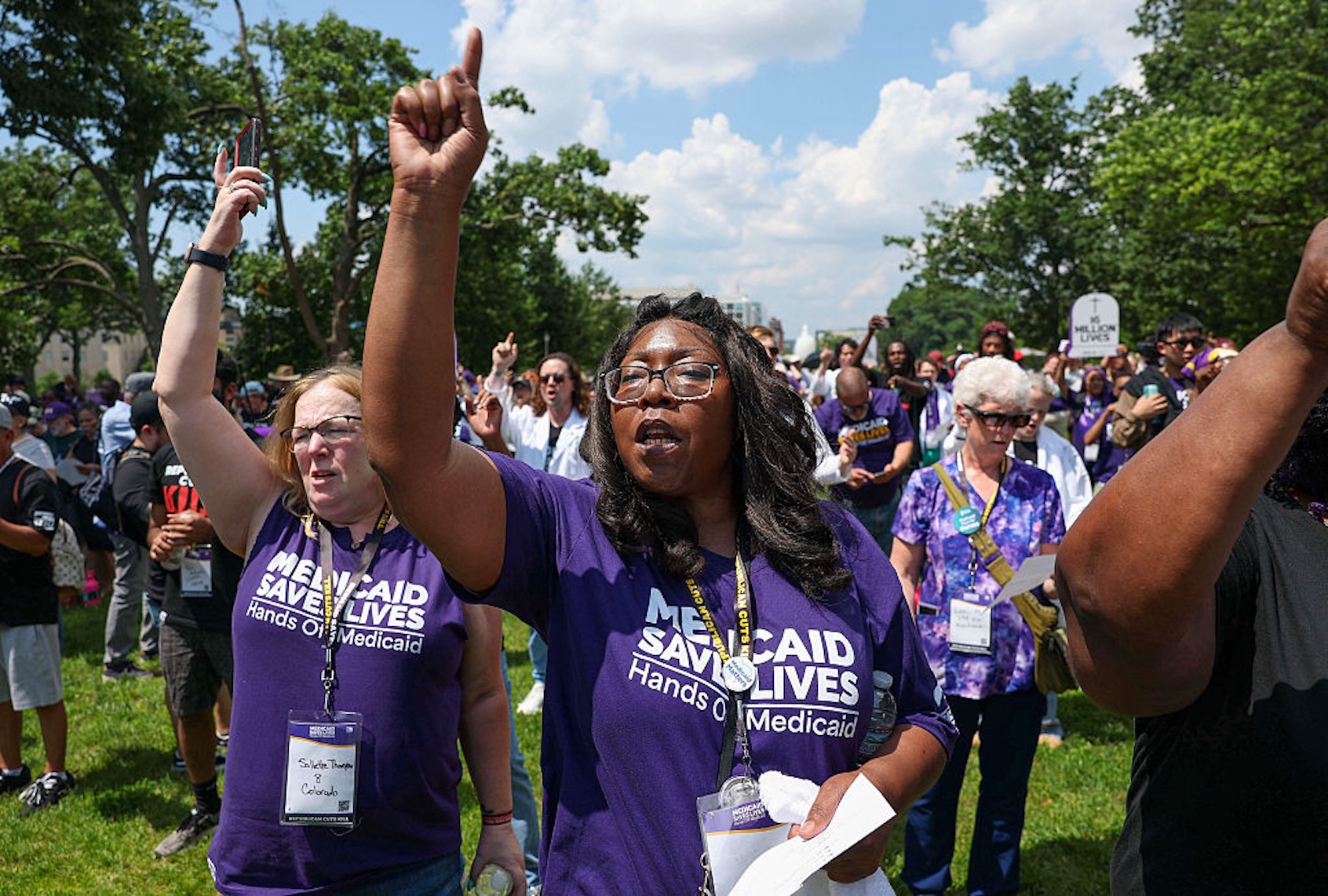My daughter Millie is a radiant young woman with thick hair, a brilliant smile and multiple disabilities. She doesn’t walk independently, she can’t feed herself, she’s legally blind, and she doesn’t speak, sign or communicate with symbols. She has qualified for government services provided for disabled Americans since she was less than a year old. She is now 24. As a widow with a full-time job, I understand the value of paid care; my daughter and I can’t live without it.
President Donald Trump‘s “One Big Beautiful Bill Act” will reduce Medicaid spending by nearly $1 trillion over a decade. Since it passed the Senate and House, and was signed into law by the president earlier this month, I have met each day with a sense of dread.
Medicaid pays the wages of millions of home health workers, aides and personal assistants, including Millie’s. My daughter is the definition of vulnerable. Left to her own devices, she’d die of thirst and hunger. If a fire broke out in our house, she would burn. Her caregivers feed her, toilet her, bathe her, strap her into her wheelchair, take her for walks and take her swimming. They accompany her to adaptive bowling and dances with other disabled young people, and if the noise is too much for her, they take her home. When I’m gone, they tuck her in, and at 2 a.m., when she pops up like a jack-in-the-box, giggling and whining, they sit with her until she exhausts herself and falls back to sleep.
My daughter is the definition of vulnerable. Left to her own devices, she’d die of thirst and hunger. If a fire broke out in our house, she would burn. Her caregivers feed her, toilet her, bathe her, strap her into her wheelchair, take her for walks and take her swimming.
Trump has denied that the trillion-dollar cut to Medicaid will harm my daughter. This is debatable, but one thing is certain: Millie’s caregivers and their communities will suffer. For many people, in this economy there are few good options when it comes to making a living. But unlike Uber or DoorDash drivers, caregivers can’t just turn off the app. They may be earning little, and their working conditions may be poor, but if their co-worker fails to show up to relieve them, they have no choice but to stay.
In her book “Love’s Labor: Essays on Women, Equality, and Dependency,” the philosopher Eva Feder Kittay describes this as the inherent injustice of care work. Vulnerability breeds vulnerability; anyone who has worried about a loved one knows this truth. Call it moral hazard, or simply the moral imagination. The best of our human impulses, our capacity for fellow feeling, should be fairly rewarded. It’s not. And now, in Trump’s America, empathy seems dead. But care workers are still held tightly in its grip. If empathy has ever been weaponized, it’s against them.
The moral weight of care work falls mostly on women, many of them immigrants from the Global South, who do the work that allows women like me to have a career, freedom, hobbies, enough rest. Some of the women who care for Millie are from middle-class backgrounds. Some are white, like my daughter and me. Many are from working-class and immigrant communities who have to commute at least a half-hour to reach my house.
I’ve raised both my children with the help of women who had their own children to raise, including children with significant special needs. They only see their mothers early in the morning and late at night. Millie’s aides love her, but they also love their children, and they need this job to keep their family afloat. They didn’t abandon my daughter during the most frightening months of the pandemic. Some have been with Millie since she was tiny; their children are now grown.
The needs of clients weigh particularly heavily on parents and care providers who are undocumented, the very people Trump wants to deny access to state-funded care. Here’s the deep irony: The same people who need the services provided by Medicaid are often the ones doing the work that Medicaid funds.
Want more sharp takes on politics? Sign up for our free newsletter, Standing Room Only, written by Amanda Marcotte, now also a weekly show on YouTube or wherever you get your podcasts.
According to the National Association of Counties, 40 percent of home health aides live in low-income neighborhoods and rely on some form of public assistance; 30 percent of them are on Medicaid themselves. Over one in ten direct care workers are non-citizens, many with their own disabled kids. I’ve known mothers detained at the border and separated from their medically fragile children. I’ve known parents whose own children, despite needing it, have never received government support. They hoist their sons in and out of wheelchairs after a day of feeding and bathing other people’s children. They stay up all night with their daughters, then rush them to underfunded day programs so they can make it to their low-paid job. Now they are targeted for deportation.

Rutherford’s forthcoming memoir will be released on September 30, 2025
Let me be clear: I’m not arguing that care workers only stick with their disabled clients out of pity. The moral demands of care work with people like my daughter lead beyond the stereotypes, which find nothing but suffering in disabled lives. Once, Millie and I were sitting with her aide outside a coffee shop under some scaffolding. Millie’s face was blank, and she sat motionless in her wheelchair. Passersby glanced at her, and I pictured what they were thinking: Lights out, no one home. I sometimes have the same impression. But then I noticed the sparrows making a racket overhead. Her aide whispered, “I think Millie is concentrating on the birds.”
I don’t know what Millie thinks, knows or wants — not for sure, and not reliably — and neither do her aides. They have to experiment to reach her: Listen to what she’s listening to, let her fingers explore their arms, make funny noises and laugh with her when she laughs. Caring for Millie demands a kind of curiosity that is rare in our fractured society, where we’re quick to praise or blame. To empathize with her is not to presume to understand her; it’s to get caught in the riptide of her mysterious pleasures and pains.
The riptide unleashed by this regrettable legislation will drag Millie’s aides into the shoals. The Trump administration’s cuts will reduce Medicaid spending by imposing a work requirement on able-bodied recipients. Care work is often part-time, with periods of unemployment when clients move or die. Caregivers who depend on Medicaid will lose their coverage if their monthly reporting requirement isn’t met. The administration will also stop state governments from using taxes on hospitals and nursing homes to increase their state’s share of federal dollars. In recent years, states have used the extra money to increase the wage rate for home health workers.
We need your help to stay independent
There is already a severe shortage of care workers. A year or so from now, when these changes kick in, those who remain will find themselves pressed to do more for lower pay. And that’s not counting the caregivers that ICE has already spirited away, like Nicolle Orozco Forero, from the disabled people who depend on them. The boy with autism who lost his best friend. The woman who ends up in an understaffed nursing home — a woman who could be my daughter when I’m no longer around.
With birth rates falling and the population aging, the United States needs people willing to brave the rough waters of professional caregiving. We need a path forward for undocumented care workers and a living wage for everyone who does this job. Trump, and so many other politicians, have turned their backs on the millions of recipients and workers who depend on Medicaid. The rest of us should not. We need to fight back. Empathy is a virtue; it should not be a trap. It’s time to give caregivers their due.
Read more
about this topic


